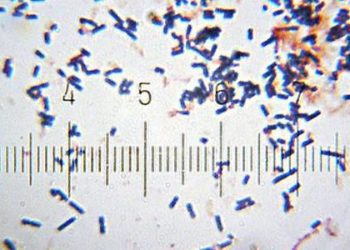Oral probiotics during pregnancy not linked to preterm delivery
1. There were no differences in preterm delivery between women randomized to receive an 8-week oral probiotic regimen and those randomized to the control group.
2. There were no differences in vaginal microbiotic health.
Evidence Rating Level: 1 (Excellent)
Study Rundown: Preterm delivery (<37 weeks gestation) accounts for 75 percent of infant mortality and more than 50 percent of long term morbidity. While some preterm deliveries are induced for maternal or fetal reasons, more than two thirds are spontaneous. A common cause of spontaneous preterm birth is thought to be subclinical chorioamnionitis, an infection in the uterus during pregnancy. Imbalances in the vaginal bacterial milieu, known as bacterial vaginosis (BV) may predispose women to developing chorioamnionitis and subsequent preterm delivery. Therefore, there is theoretical benefit to balancing the vaginal microbiota in pregnancy using probiotics, though studies to date were underpowered to assess this outcome. In this randomized, placebo, controlled trial, researchers assessed the effect of commercially available Lactobacilli probiotics on the vaginal microbiota in their first trimester of pregnancy.
After an 8-week oral Lactobacilli probiotic regimen, there was no improvement in vaginal microbiotic health compared to placebo. There was no difference in incidence of preterm delivery between the two groups, though the study was underpowered to detect this difference. Strengths included rigorous design, including triple-blinding. The duration of treatment was only 8 weeks, so although there was no difference found in this study, it’s possible that a longer treatment course could have an impact. Larger studies powered to find a difference in preterm birth are warranted, as well as studies with different probiotic regimen.
Click to read the study in AJOG
Relevant Reading: Vaginal microbiome of reproductive-age women
In-Depth [randomized controlled trial]: Pregnant women <12 weeks gestation were randomized to receive either an oral probiotic regimen of Lactobacillus rhamnosus and L. reuteri,(n = 144) or a placebo (n = 148) for 8 weeks. Vaginal swabs taken before and after the intervention were compared according to the Nugent scoring system, an established scoring system for BV. Telephone interviews were also conducted before and after intervention and after delivery. The primary outcome was normal Nugent score (<4) post intervention. Secondary outcomes included intervention-associated side effects, duration of pregnancy, preterm deliveries, and miscarriages.
There was no difference in the rate of preterm delivery between the two groups (3.8% vs. 5.0%, p = 0.59). Following the intervention, the proportion of participants with normal vaginal microbiota decreased from 82.6% to 77.8% (4.8% decline) in the treatment group and from 79.1% to 74.3% (4.8% decline) in the placebo group, with no significant difference across groups (p = 0.297). Symptoms most frequently reported were vaginal discharge and changes in stool consistencies.
Image: CC/Wiki/BobBlaylock
©2016 2 Minute Medicine, Inc. All rights reserved. No works may be reproduced without expressed written consent from 2 Minute Medicine, Inc. Inquire about licensing here. No article should be construed as medical advice and is not intended as such by the authors or by 2 Minute Medicine, Inc.






